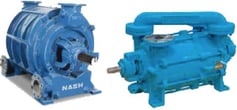
1. How do I know what kind of pump I need?
It depends upon the application. If you need to remove air and gas molecules from a manufacturing process, a Vacuum Pump is ideal. This kind of pump can be used in the production of food & beverage products, semiconductors, electronics components, pulp & paper, medical products, plastics, and more.
Other commonly used types of pumps include Centrifugal Pumps for propelling water, solvents, organics, oils, acids, bases, and other “thin” liquids used in industrial and agricultural environments; Positive Displacement Pumps for moving high viscosity fluids such as oil, paints, resins, and foodstuffs in environments where accurate dosing or high-pressure output is required; and Air Diaphragm Pumps for chemical processing, wastewater treatment, mining dewatering, paint and ink production, and transfer of food products. Their self-priming and dry run features make them ideal for many industrial applications.
2. Can I repair my pump, or do I need to replace it with a new one?Generally, if the cost to repair a pump or pumping system is more than 50% of the cost of replacing the pump or system, it is best to replace the equipment.
 If you are unable to pinpoint the cause of pump failure as being electrical, mechanical, or hydraulic, you may be throwing good money after bad, as the expression goes, so it is best to cut your losses and invest in a new pump or pumping system.
If you are unable to pinpoint the cause of pump failure as being electrical, mechanical, or hydraulic, you may be throwing good money after bad, as the expression goes, so it is best to cut your losses and invest in a new pump or pumping system.
Repair can be a desirable option if the pump is not critical to production OR if you have a backup pump available. Replacement may be the only option if the pump is mission-critical and there are no backups available.
3. How do I know that my pump has the right specifications for my particular application?
Generally, you don’t unless you work with an expert. That individual can help you synthesize data related to the type of fluid being pumped (corrosive, non-corrosive), viscosity (fluid thickness), corrosiveness (potential for the pump frame and parts to rust and malfunction), and temperature (how hot or cold the pumped fluid is).
The expert can also help you determine the ideal pressure (force the pump must exert on the fluid to move it) based on the application environment (hot, cold, humid, dry, hazardous, non-hazardous) and help you estimate the cost (several hundred dollars to several thousand to tens or hundreds of thousands for pumping systems).
You should also get the details of the warranty (be sure you know what is covered and for how long), and service & support covered (make sure the manufacturer and its distributor partner can help you troubleshoot any problems that may occur).
4. How do I know whether my pump is operating at optimal flow and pressure rates?To determine whether your pump is operating efficiently, measure the power consumed by the pump and check it against the pump’s performance curve. The performance curve will specify how much power you should use at the flow and pressure your pump is generating. This test helps you to identify which pumps in your facility are operating inefficiently. If you need assistance with running the test described, a systems engineer can assist you.
5. From the time I order a pump or pumping system, how long must I wait for the pump or system to be installed?Generally, it takes several days to several weeks from the time you place your order until the pump or system is installed. To make sure there are no surprises that compromise your ability to meet production schedules, it is essential to have a firm understanding of the expected installation date, and to have a Plan B in case delivery and installation times are delayed.
6. How much should I expect to invest in a vacuum pump or pumping system?When purchasing a single vacuum pump, you should expect to invest several thousand dollars to tens of thousands, depending upon your application’s requirements. A system comprised of several pumps to a dozen or more would range from $20,000 to $250,000.
To discuss your pump or pumping system requirements…


